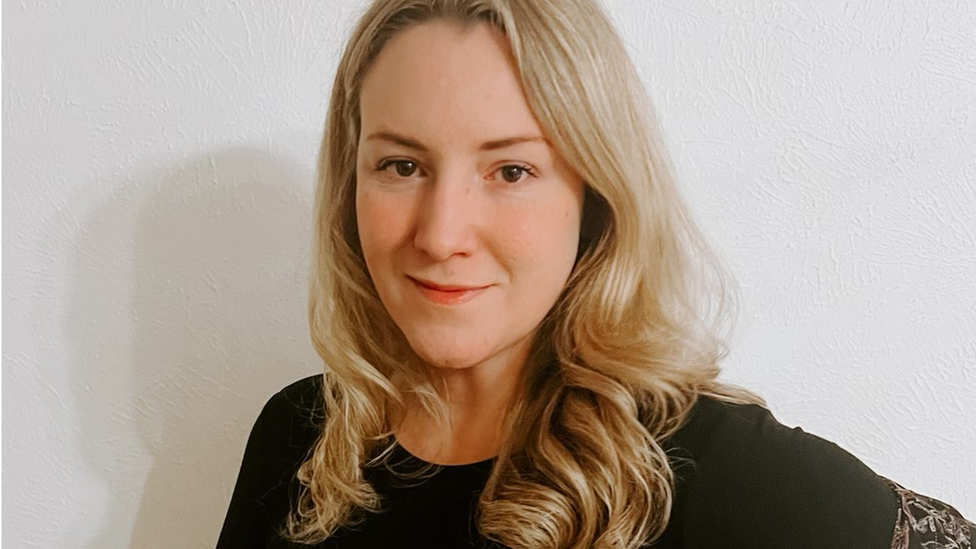Kate Cox: Texas Supreme Court cancels abortion exception
- Published

The Texas Supreme Court has ruled against a woman seeking an abortion for her high-risk pregnancy, hours after her lawyers said she was leaving the state for the procedure.
Kate Cox, 31, had sought an abortion after her foetus was diagnosed with a fatal condition that doctors said threatened her fertility.
A lower court granted an exception, but that order was overturned on Monday.
Texas has one of the strictest abortion bans in the country.
The state's overlapping bans prohibit abortion from the point of conception, except in rare cases where the life of the expectant mother is under threat. Abortion advocates argue the exception is too vague and puts women's health at risk.
In its seven-page ruling, the Texas Supreme Court found that Ms Cox's doctor had not proven that her safety was threatened due to a "life-threatening physical condition" as required under the law.
"These laws reflect the policy choice that the Legislature has made, and the courts must respect that choice," the justices wrote.
The case was believed to be the first instance of a woman seeking a court's permission for an abortion since the US Supreme Court overturned Roe v Wade last year, giving individual states power to control abortion access.
Ms Cox, a mother of two from the Dallas area, sought an abortion after her foetus was diagnosed with Trisomy 18, a chromosomal disorder which in the majority of cases results in miscarriage, stillbirth or the death of the baby within the first year of life. Ms Cox's physicians told her that continuing the pregnancy could jeopardise her future fertility.
According to Ms Cox's court filings, doctors refused to perform an abortion on her, saying their "hands were tied" as long as her baby had a heartbeat.
She was granted an exception by a Texas judge on Thursday. But the state's Attorney General Ken Paxton quickly threatened criminal prosecution against any doctors or healthcare providers who helped her obtain an abortion.
Mr Paxton also asked the state's Supreme Court - whose nine members are all Republicans - to intervene. The court obliged, temporarily blocking Ms Cox from obtaining an abortion while it reviewed the case.
On Monday, lawyers for Ms Cox announced she had left Texas to obtain an abortion outside of the state. There is no Texas-wide law prohibiting travel outside of the state for an abortion.
"This past week of legal limbo has been hellish for Kate," said Nancy Northup, president of the Center for Reproductive Rights, the pro-choice group representing Ms Cox. "Her health is on the line. She's been in and out of the emergency room and she couldn't wait any longer."
Just hours after the announcement by Ms Cox's lawyers, the state Supreme Court announced it had ruled against her.
Watch: Lawyer for Kate Cox speaks on Texas abortion ruling
"This should never happen in America," President Joe Biden said on Tuesday in a statement about Ms Cox's case.
"Legal and medical chaos, as we are witnessing in states like Texas, Kentucky and Arizona, is a direct result of Roe v Wade being overturned, and as we predicted would happen, women's health and lives now hang in the balance," he added.
Speaking to the BBC on Monday, Molly Duane, a lawyer for the Center, called the Supreme Court's ruling "stunning".
"Politicians like to tout medical exceptions as being reasonable and available, as Kate's experience shows they simply don't exist in practice," she said.
The Texas Supreme Court is currently weighing another abortion case related to the state's health exception, also led by Ms Duane and the Center for Reproductive Rights. Twenty-two plaintiffs - including doctors and women denied abortions in the state - have sued to clarify the existing state bans, saying the medical exception is dangerously unclear.
The near-total bans have left physicians "terrified" to use their medical judgment over fear of harsh penalties, Ms Duane told the court last month. Doctors who perform abortions in Texas could risk life in prison, loss of their medical licence and hundreds of thousands of dollars in fines.
A lawyer for the attorney general, Beth Klusmann, argued existing standards allowed physicians to use "reasonable" medical judgment.